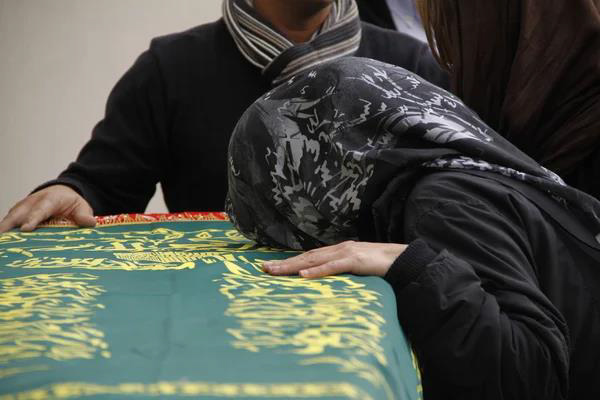
In Islamic funeral practices, a common misconception persists that women are barred from participating in burials and visiting graves, an idea often shaped more by cultural influences than by Islamic jurisprudence. This misunderstanding suggests a gender-based restriction on mourning rites, despite a lack of support in foundational Islamic texts. Through a careful examination of the Quran and Hadith, the records of Prophet Muhammad’s (PBUH) actions and sayings, it becomes evident that Islam upholds a model of gender equity, granting both men and women the right to commemorate the deceased. This essay will explore Islamic teachings on women’s participation in funerals, address misconceptions around Quranic verses like Surah Al-Takathur, and underscore Islam’s inclusivity.
The Misconception: Emotional Vulnerability as a Basis for Prohibition
A prevalent argument against women’s participation in funerals centers on the notion of emotional vulnerability, suggesting women may display grief in ways that disrupt the solemnity of the rites. This perspective overlooks the resilience of women and the Islamic allowance for the expression of sorrow. Grieving is a natural response, and Islam does not mandate emotional suppression. Rather, the faith recognizes and accommodates human emotions, providing compassionate guidance on how to mourn respectfully.
Islamic Evidence Supporting Women’s Participation
The Quran’s Emphasis on Gender Equity
The Quran provides no explicit prohibition against women attending funerals or visiting graves. Instead, it consistently emphasizes equality and respect for both genders in religious obligations and rights. Surah Al-Hujurat (49:13) declares, “O mankind, indeed We have created you from male and female and made you peoples and tribes that you may know one another. Indeed, the most noble of you in the sight of Allah is the most righteous of you.” This verse upholds the principle of equality, without prescribing genderbased limitations on participation in religious practices. It encourages Muslims to prioritize righteousness over gender distinctions.
Hadith and the Practices of Prophet Muhammad (PBUH)
The Hadith provide further clarity on the permissibility of women’s involvement in funeral rites. Prophet Muhammad permitted women to attend funerals, though he advised them to avoid following the procession to the gravesite to protect them from intense grief. This guidance, however, was intended as advice rather than an absolute prohibition, underscoring a protective rather than restrictive intention.
A significant narration from Aisha (RA), the Prophet’s wife, illustrates a shift in guidance regarding grave visits. Initially, the Prophet advised against visiting graves, but he later allowed it, emphasizing its spiritual benefits as a reminder of the hereafter. This permission applied universally, without gender distinction, highlighting that both men and women are encouraged to contemplate mortality and the afterlife.
Surah Al-Takathur: A Universal Message Beyond Gender
In discussions on gender inclusivity in Quranic teachings, Surah Al-Takathur provides a noteworthy example. Verse 1 warns against the rivalry in accumulation, urging believers (both men and women) to shift their focus from material gain to spiritual priorities which can be achieved by visiting the graves as stated in Verse 2. Some assume that admonitions like these target men exclusively. However, several key points indicate otherwise:
1. Universal Language and Quranic Address: The Arabic language uses masculine forms generically, often addressing humanity at large. In the absence of specific gendered language, the message of Surah Al-Takathur is understood as applicable to all.
2. Context and Human Concerns: Themes of material accumulation and spiritual distraction are universally relevant, affecting both men and women. Hence, Surah Al-Takathur addresses shared human tendencies and reminds all Muslims to reflect on their life’s priorities.
3. Accountability in Islam: Islamic theology asserts that all individuals, regardless of gender, are accountable for their actions. The Day of Judgment, a recurring theme in the Quran, applies to everyone, underscoring the inclusivity of Quranic guidance.
4. Historical Interpretations and Scholarly Consensus: Islamic scholars widely agree that the Quran’s moral and ethical teachings are universal. This perspective aligns with the Quran’s broader principles of accountability and inclusivity, advocating for a holistic approach to Islamic guidance for the entire community.
5. Principle of Inclusivity in Islamic Teachings: The overarching principles of Islam— compassion, equality, and inclusivity—reinforce that Quranic instructions pertain to the upliftment of all Muslims. Interpreting these admonitions as exclusive to men would conflict with these principles.
Re-evaluating Cultural Norms vs. Islamic Teachings
The conflation of cultural traditions with Islamic teachings is a critical factor in perpetuating misconceptions around women’s participation in funeral rites. Regional customs, sometimes influenced by pre-Islamic practices, have led to restrictive views on women’s roles in these solemn observances. A more authentic approach to Islamic jurisprudence, informed by Quranic values and the Prophet’s teachings, reveals that Islam does not bar women from attending funerals or visiting graves.
Conclusion
The belief that Islam restricts women from funeral observances stems from cultural rather than religious sources. Islamic teachings, rooted in the Quran and Hadith, advocate for an inclusive approach that respects the emotional nature of all individuals without imposing undue restrictions based on gender. Revisiting and interpreting Islamic teachings through the lens of equity allows for a more accurate understanding, ensuring that the communal inclusivity encouraged by Allah is upheld in practices surrounding death and mourning. In Surah Al-Takathur, as in other parts of the Quran, Islam calls upon all believers—men and women alike—to reflect on their lives and embrace the values of compassion, humility, and spiritual awareness. By understanding Islam as a faith that honors the rights of all individuals, we reinforce its call for accountability and inclusivity, embodying the spirit of a faith that uplifts and unifies all members of the community in life, death, and beyond.


